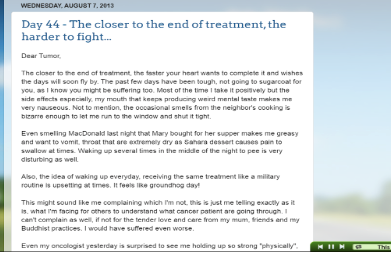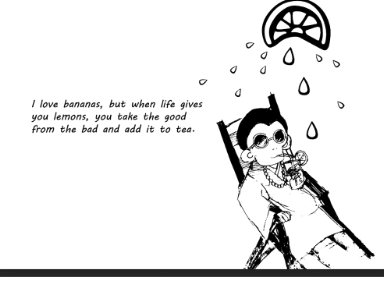TLDR: From career to cancer, Kyle reflects on the treasures he gained from sharing his life stories through writing
How I Started Writing
I never considered myself a writer, let alone a writer who writes about Buddhist Dharma. I suppose most of us have unique talents when it comes to analysing and understanding the Dharma.
Growing up, I struggled with academics, but excelled in asking the question “why.” I possessed a strong sense of skepticism and curiosity that drove me.
When I wrote my first book, 108 Places to See Before Nirvana, I was trying to find a way to sustain my life while staying close to Buddhism.
Shortly after publishing, I was diagnosed with cancer. Suddenly, my goal of sustaining my livelihood became a fight for survival.
I spent a year living in a bubble, avoiding crowded places to protect my compromised immune system.
Reflecting on My Cancer Journey
During my cancer treatment, I spent a lot of time in my room writing about how I applied Dharma knowledge to overcome my illness.
The blog began with a dialogue with the cancer tumour, starting with the opening line in every blog entry, “Dear Tumor” allowed me to view my condition from a different perspective. I chronicled my entire journey, all the way up to my last day of chemo and radiotherapy.
Looking back, I’m not entirely sure why I began my blog.
At first, I intended to keep my loved ones informed about my condition so they wouldn’t fret (especially since I was too drained to speak to anyone in my vulnerable state). But writing turned out to be therapeutic.
I reflected on my experiences and how they were intertwined with Dharma. Writing helped me to release my emotions and validate my experiences.
Now, 10 years into remission, I view the blog as a personal keepsake and inheritance that I gained from my cancer treatments.

How Sharing My Story Inspired Others
Though I was unsure if my writing would resonate with readers, I felt compelled to share.
After publishing my blog, I received messages from many who applauded my state of mind and found inspiration in my experiences.
Even those who didn’t have cancer could relate to my Dhamma reflections, showcasing the beauty of it., The Dhamma can offer guidance and support in any situation.
It would be wonderful if young students could learn from the Dharma’s wisdom, not necessarily as a religious doctrine, but as a syllabus for navigating life’s challenges.
Curveballs
Life has a way of throwing curveballs (which we all are aware of from the First Noble Truth), but I’ve learned to make the best of them.
I even created a new recipe for lemon tea out of the lemons life gave me. This analogy came to me while writing my second book, Life I’ve Learned as Monk Key, which describes my journey to cancer recovery after that difficult year.

Tragedy didn’t stop there. Shortly within a year after my treatments, I lost several loved ones, including a close friend and my father. This was followed by my chum’s father who suffered from the same cancer as me.
My struggles with guilt and grief for my father are documented in an article I wrote for Handful of Leaves.
I rented a small hut in Koh Phangan to heal, and somehow I found myself opening up my laptop and starting to write again.
Although my book, Monk Key, primarily details my battle with cancer, I also dedicated a chapter to my father and the other loved ones whom I lost in that challenging year.
Writing has now become my sanctuary, and at first, I wrote Monk Key to express my gratitude to those who supported me during my illness.
Little did I know, it also helped me with confronting my grief.
Sharing stories: Not for personal gain
As a Buddhist writer, I believe fame and fortune are not the end goals of publishing.
While it would be nice to gain more readership, my ultimate aim is to share my intimate life story in a way that allows readers to see things from a different perspective.
It’s not a flawless process, but I hope that it will lead to meaningful reflection.
I believe that writing can be a powerful tool for personal growth.
Through the act of putting our thoughts and experiences into words, we gain life’s clarity and insight.
And when we share our writing with others, we have the potential to inspire and connect with people profoundly.
With that said, I think there are a few key benefits to prioritising the sharing of our stories over personal gain:
- Authenticity: When our primary goal is to share our story and connect with others, we’re more likely to write authentically. We’re not as concerned with crafting a certain image or projecting a certain persona – we’re simply sharing our truth.
- Connection: Writing can be a powerful tool for building connections. When we share our stories, we invite others to see us for who we truly are. And when we’re vulnerable in our writing, we create opportunities for others to connect with us on a deeper level.
- Perspective: Finally, I think that sharing our stories can help us gain perspective on our lives. When we see our experiences reflected back to us through the eyes of others, we can gain new insights and understanding about ourselves and our place in the world.
Overall, I believe that prioritising the sharing of our stories is a noble and worthwhile pursuit. While fame and fortune may be tempting, the true value of writing lies in its ability to inspire, connect, and transform both the writer and the reader.
My Wishes for Budding Dhamma Writers
To all aspiring writers, especially those who write in the context of Buddhist Dhamma, I hope for you to find pleasure in any accolades and wealth the world may bestow upon you.
May you receive heaps of positive reviews, easily brush aside poor ones, and have Kalyanamitras to weather any storms. You can write for Handful of Leaves and submit your story here.
But most of all, I wish you the honest, quiet, and enduring satisfaction of completing a written work from start to finish.
The pure, child-like joy of admiring something you have created – a unique manifestation and expression of your experiences – and, lastly, the generous joy of giving your stories away.
Wise Steps:
- Start Writing: Try writing or another form of creating as a way to digest your experiences and share your story
- Find Clarity on Intention: The precious value that comes from prioritizing the sharing of our stories over personal gain
- Allow Yourself to be Surprised: Keep an open mind about what your writing could bring to you and the people reading it


